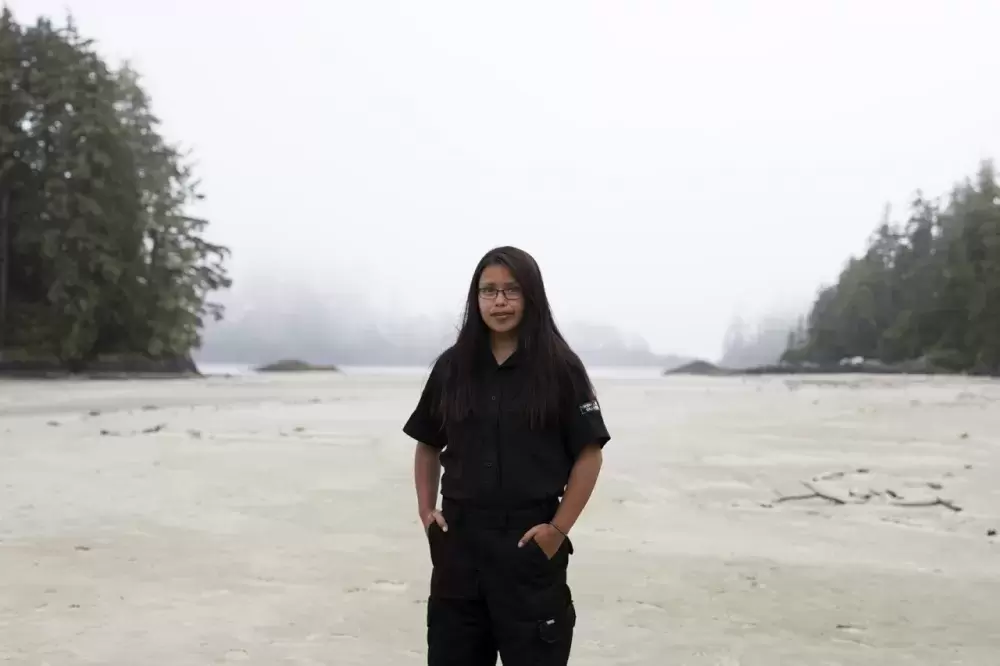In the final weeks of another busy summer in Tofino, the Tla-o-qui-aht is urging more local businesses to partner with the First Nation to better protect its members from COVID-19.
Despite measures to limit contact during the coronavirus pandemic, the streets of Tofino are humming with visitors eager to enjoy the west coast destination. Long Beach has also been active with people from across Western Canada – with some venturing from Ontario, Quebec and even parts of the United States.
Access to the nearby Tla-o-qui-aht communities of Esowista and Ty-Histanis have been restricted to residents, with gates manned by members performing health checks.
“We’re confirming where people have been for backward tracing if needed, but also mitigating the outside traffic that comes into the community,” said Tla-o-qui-aht Tribal Administrator Saya Masso. “That’s a really important tool for being able to open our homeland to share it to the million tourists that come each year.”
Access to the First Nation’s communities by Long Beach has also been patrolled by Tribal Parks guardians, but this program ends in the first week of September - with no funding in place to ensure entry points are watched in the fall.
Managing back roads is also a concern, said Masso.
“A lot of people have been using our back roads for camping and summer activities,” he said. “We need better resources for our guardian program to manage the back roads, to help clean up the back roads that people utilized when they’re seeking their personal space away from COVID.”
The guardians have been paid through the Tribal Parks Allies program, which partners with local businesses to contribute one per cent of sales for “the ecological protection and restoration of the Tribal Parks ancestral gardens and the resurgence of Tla-o-qui-aht culture and governance,” according to the program’s website.
“It comes from the client, not from the business operator,” clarifies Masso. “If it’s a $100 hotel room, we ask that it voluntarily be charged at $101.”
After over a year and a half of development with local businesses, 37 operators are Tribal Parks Allies, one of the most recent being Hotel Zed, which opened its Tofino location in August. But with over 300 businesses listed with the Tofino-Long Beach Chamber of Commerce, current participation in the allies program isn’t enough to protect Tla-o-qui-aht communities from coronavirus infection as visitors continue to flock to Vancouver Island’s west coast, said Masso.
“It may provide certainty for only a week or so, but not enough to deal with the larger issues and the fact that we want to reopen our territory in March, next year, and there still will be a shortage of hospital beds,” he said. “There’s a $350 million-dollar economy leaving our territory. If through voluntary fees we get something like $2-3 million annually, we would be able to address all of our needs.”
Other needs include building isolation units, which would be temporary living quarters where confirmed cases or those who could have been exposed can safety quarantine for 14 days. Another goal of the program is to expand the Tofino hospital beyond its existing 10 beds, thereby bringing back a maternity ward that was eliminated over a decade ago.
“We would like to bear children in our own homeland again,” said Masso, whose three children were born in Port Alberni.
Laura McDonald, president of the Tofino-Long Beach Chamber of Commerce, said that the business group has worked with the Tla-o-qui-aht to develop the Tribal Parks Allies program since 2018.
“Since then, a chamber representative has sat on the task force that is working on community implementation of the program,” she explained. “It is the chamber’s hope that the work continues at that table.”
The neighbouring Ahousaht and Hesquiaht First Nations have kept their territories closed over the course of the pandemic. But with many of its members employed in tourism-reliant businesses and the ownership of the Best Western Tin Wis hotel, The Tla-o-qui-aht opted to cautiously welcome visitors back to its territory in June.
“For some of our member businesses, this summer has been busier than anticipated,” said McDonald, adding that this high demand has been managed with less staff and increased operational costs. “For others circumstances surrounding COVID-19 have meant their business is operating at a significantly reduced capacity and with additional costs, so it has not been as good.”
In retrospect, Masso believes that the situation could have unfolded more favourably if widespread participation in the Tribal Parks Allies program was a condition.
“We need to build back better,” he said. “If we’re talking about after four months reopening again, they should have said ‘Let’s reopen with this one per cent fee’.”
In June the provincial government announced Phase 3 of its plan to recover B.C.’s economy, which included reopening hotels and resuming film productions. But over the summer months infections steadily rose to over 1,100 by the end of August.
"After many months of restrictions, we all felt the need to reconnect with our family and friends this summer, but now we must slow down on our social interactions and prepare for the respiratory season ahead,” cautioned Minister of Health Adrian Dix, and Dr. Bonnie Henry, B.C.'s provincial health officer, in a joint statement issued Aug. 31. "We need everyone to pay attention and step back from the social interactions we have had this summer, so when the cooler weather and respiratory season arrives, we are ready for the challenge.”
“I’m trying to avoid a situation where our members feel so unsafe that they want tourism to take a hiatus while we let the [pandemic] clear through the area,” said Masso.







